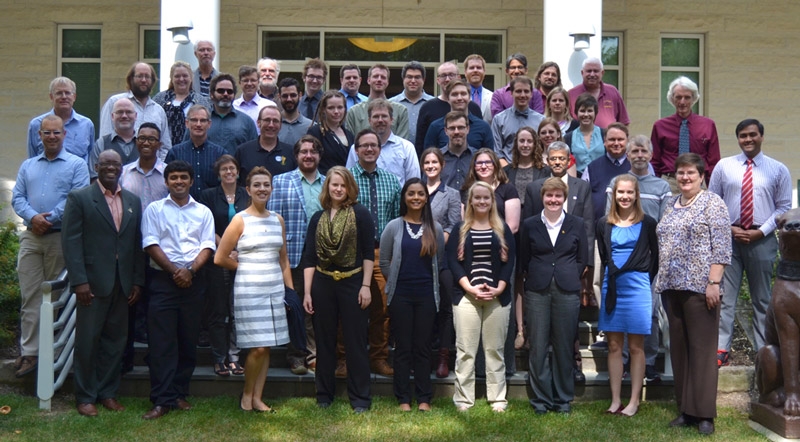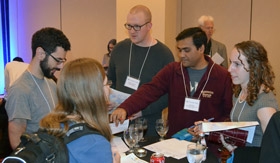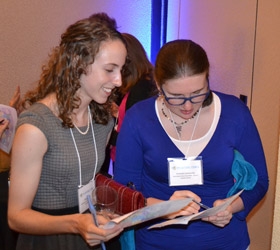Membership of the Society of Physics Students is dynamic. With the majority of members being undergraduates, the ranks of this ~4,500-member society are constantly changing, but always include active and enthusiastic students. SPS membership is open to anyone interested in physics, astronomy, and related fields. Students join for a wide variety of reasons, including social interaction with others in their field, an opportunity for a scholarship or internship, and a chance to grow as a leader. While many are primarily active within their own local chapters, SPS encourages involvement at the regional and national levels. Building connections between these students across the nation and around the world is central to SPS activities. With our goal to aid the development of students into well-rounded professionals and members of society, we need to help them see beyond the walls of their classrooms and the gates of their schools to a world full of possibilities to explore and problems to address. The SPS National Council helps define the path for creating such a robust society.

Every year at this time, physics faculty and students from across the nation assemble at ACP for the Society of Physics Students National Council meeting, and the 2014–15 Council just wrapped up its annual meeting yesterday. The council consists of members of the SPS Executive Committee and one student and one advisor from each of the 18 SPS zones. They represent a wonderfully diverse cross section of the membership. This year’s council hails from private and public institutions, community colleges, liberal arts colleges, and large research universities. Consistent with SPS’s tradition of strong representation of women in leadership, half of the student councilors are women. In 2010, I experienced my first council meeting as councilor for Zone 2 (New York, Ontario, and Quebec). It was an honor to engage the council in a different role this year, as the new director of SPS and Sigma Pi Sigma.
We opened this year’s program by honoring Toni Sauncy for her service to SPS as a chapter advisor, zone councilor, president, and director. She first held the role of chapter advisor at Angelo State University in San Angelo, TX, for 12 years, and has again assumed that role in her new position at Texas Lutheran University in Seguin, TX. Our guest speaker, Sharon Stephenson of Gettysburg College, posed the question, “Who are five female physicists I could ask?” As one of the leading spokespersons for increasing representation of women in physics, Stephenson’s talk brought both awareness to the value of diversity and set the context for the meeting: for the council to engage in wider issues that affect the physics community as a whole.

The council takes on several roles: liaisons, organizers, decision makers, and strategists. Members are primary conduits between university chapters and the National Office, and are often directly involved in planning zone meetings across the country. They also help select chapter and individual award winners. Perhaps most importantly—and the central focus of the meeting—the council sets the priorities for the society for the upcoming year.
After an extensive briefing from the staff on the state of and activities of the society over the past year, the council is tasked with developing a roadmap for moving SPS forward. Much of the detailed work of that planning begins within the council committees, of which there are six this year: Advisors, Benevolence, Congress, Diversity, Engagement, and Feedback.
The Advisors, Engagement, and Feedback Committees explore how to best reach the local chapters, which are at the heart of most SPS activities. The Advisors Committee seeks to increase training, support, and recognition of the valuable but often thankless volunteer position of chapter advisor. The Engagement Committee focuses on how to increase membership and get the membership more involved in SPS programs at the zone and national levels. The Feedback Committee looks specifically at SPS awards and scholarships to see how to increase the quantity and quality of applications.

The Benevolence and Congress Committees are both tasked with helping to engage Sigma Pi Sigma alumni members. The Benevolence Committee works to connect alumni with students and student chapters, to serve as guest speakers or mentors. Over the past few Sigma Pi Sigma Quadrennial Congresses, the focus has shifted from being a meeting of Sigma Pi Sigma members to being the premier conference for physics undergraduates. While there is broad agreement that the focus on undergraduates should be maintained, the Congress Committee will make recommendations on how to better involve and engage Sigma Pi Sigma members in the congress.
The council’s long-standing Diversity Committee tackles critical issues around underrepresented groups. In recent years, the committee has put forth a Statement on Diversity that was adopted by SPS, recommended the creation of the Future Faces of Physics Award for outreach to underrepresented groups, and asked for impact data from projects funded through those awards. Such data was collected for the first time during the past year, and this year the committee will examine this data to assess the value of the Future Faces of Physics program and provide recommendations on how to maximize the impact moving forward.
While the council travels to ACP only once each year, their valuable work continues throughout the year. The connection that the council provides between the SPS National Office and membership enables us to work together to better serve the undergraduate physical sciences community. For this we owe the council a world of thanks.
